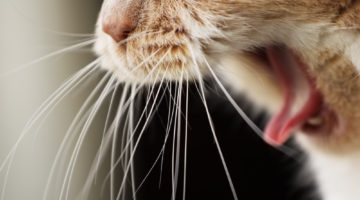Are essential oils really toxic to cats? It all depends on the quality of the oils, and how they’re used.
Cats are unique. In the veterinary community, we express over and over that cats are not small dogs. This is especially true in my area of expertise — essential oils. Even the mention of essential oils and cats in the same sentence can send aromatherapists and cat lovers into a frenzy: “Essential oils are toxic to cats! Never use them!” However, much of what we “think” we know about cats and essential oils is misinterpreted and outdated.
I believe we need to view essential oils much as we view anesthesia. The latter can be a wonderful and life-saving modality; however, in overdose, we call it euthanasia. That may sound like an extreme analogy, but it’s one I think is quite accurate. I would never allow a client to calculate or create an anesthesia protocol for me. Nor would I allow them to source their own anesthetic online and bring it to my practice for use.
Essential oils for cats should be viewed in a similar manner, in my opinion. They should not be totally shunned as potentially toxic, but neither should they be ignored for the wonderful and natural results they can bring. They should, however, be respected.
Quality plays a big role
One of the biggest factors responsible for getting essential oils labeled as dangerous or toxic for cats (or other animals) is quality. Finding a truly high grade essential oil that I feel comfortable using is getting harder and harder. As the popularity of essential oils grows, so does the number of companies selling them. And you can be certain they will all have the same punch line: “Ours are great! Trust us!” The problem is, none of these companies are sourcing their essential oils with veterinary medicine in mind. Profits are almost always at the forefront of the essential oil market. The number of essential oil consumers is increasing, but the availability of truly high quality oils is not increasing at the same rate.
Essential oils for animals, especially cats, should be selected by a veterinarian with advanced training. This training should include work with other veterinarians, chemists, aromatic medicine specialists, aromatherapists and others in the field. Often, I have had to venture into the human education field to learn more about essential oils as they pertain to aromatic medicine. Although I have learned much from being a “member” of the essential oil community, I fully recognize how this information has been used more to sell products than to truly advance veterinary aromatic medicine.
Veterinary aromatic medicine vs. aromatherapy
You’ll notice I use the term “veterinary aromatic medicine”. I believe this to be a better term than “aromatherapy” when discussing the use of essential oils with animals, including cats. It simply conveys more respect and accuracy than “aromatherapy”. The use of less-than-veterinary grade oils, which are so common in the aromatherapy world, is similar to spraying a cat with air freshener or perfume, then wondering why it’s not a healthy option. This quality fluctuation in the essential oil industry is certainly responsible for many of the toxicity reports I have researched and followed. It is entirely a buyer beware situation.
 “Liver enzyme deficiency”
“Liver enzyme deficiency”
The other main topic to bring up when it comes to cats and essential oils is the “liver enzyme deficiency” statement. This is often quickly offered as evidence as to why cats and essential oils should not mix. However, the word “deficiency” is misleading. It isn’t as if cats are abnormal because they do not have the same exact complement of liver enzymes that humans or dogs do.
But is this reduction of certain enzymes in cats an actual problem? We used to think cats could not tolerate morphine. However, the truth is that we just didn’t know how to use it with cats. While in vet school, I was taught that morphine was something to be very concerned about; but in speaking to current veterinary students, the concept that morphine is a “problem” doesn’t seem to exist. They are simply taught how to properly use it in the first place.
This is where I feel the subject of essential oils and cats will evolve to as well. It is not true that cats do not metabolize essential oils, or that the oils will accumulate over time and kill them. The truth is that we need very high quality oils, screened specifically for use in veterinary applications, and use them in cat-appropriate doses and regimens. With this knowledge, essential oils can be used in cats with incredible benefits.







No Comment